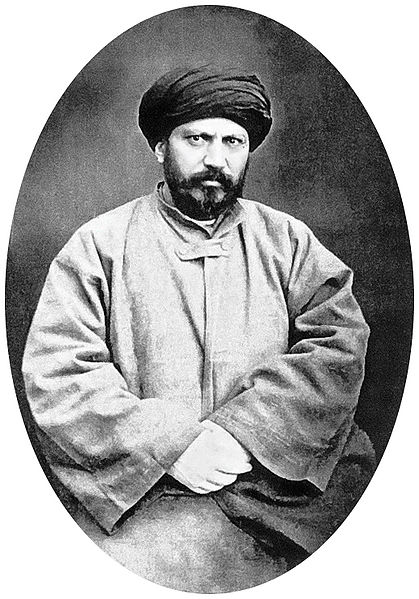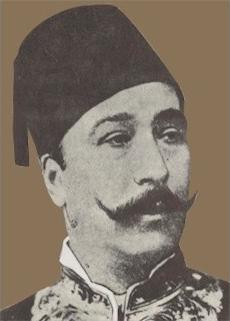<Back to Index>
- Political Activist and Ideologist Sayyid Jamal ad-Din al-Afghani, 1838
- Prime Minister of Egypt Mahmoud Sami el-Baroudi, 1839
PAGE SPONSOR

Sayyid Jamāl ad-Dīn al-Afghānī (Persian: سید جمالالدین افغاني), also known as Sayyid Jamāl ad-Dīn Asadābādī (Persian: سید جمالالدین اسدآبادی), and commonly known as Al-Afghani (1838 / 1839 - March 9, 1897), was a political activist and Islamic ideologist in the Muslim world during the late 19th century, particularly in the Middle East, South Asia and Europe. One of the founders of Islamic Modernism and an advocate of Pan-Islamic unity, he has been described as "less interested in theology than he was in organizing a Muslim response to Western pressure."
He claimed to be of Afghan origin most of his life but convincing evidence shows that he was in fact born in Iran. Although some older sources claim that al-Afghani was born in a district of Kunar Province in Afghanistan which is also called Asadabad, overwhelming documentation (especially a collection of papers left in Iran upon his expulsion in 1891) now proves that he was born in Iran, in the village of Asadābād, near the city of Hamadān into a family of Sayyids. Records indicate that he spent his childhood in Iran and was brought up as a Shi'a Muslim. According to evidence reviewed by Nikki Keddie, he was educated first at home then taken by his father for further education to Qazvin, to Tehran, and finally, while he was still a youth, to the Shi'a shrine cities in Iraq. It is thought that followers of Shia revivalist Shaikh Ahmad Ahsa'i had an influence on him. An ethnic Persian, al-Afghani claimed to be an Afghan in order to present himself as a Sunni Muslim and escape oppression by the Iranian ruler Nāṣer ud-Dīn Shāh. One of his main rivals, the sheikh Abū l-Hudā, called him Mutaʾafghin ("the one who claims to be Afghan") and tried to expose his Shia roots. Other names adopted by Al-Afghani were al-Kābulī ("[the one] from Kabul") and al-Istānbulī ("[the one] from Istanbul"). Especially in his writings published in Afghanistan, he also used the pseudonym ar-Rūmī ("the Roman" or "the Anatolian").
At the age of 17 or 18 in 1855 - 56, Al-Afghani traveled to British India and spent a number of years there studying religions. In 1859, a British spy reported that Al-Afghani was a possible Russian agent. The British representatives reported that he wore traditional cloths of Noghai Turks in Central Asia and spoke Persian, Arabic and Turkish language fluently. After this first Indian tour, he decided to perform Hajj or pilgrimage at Mecca. His first documents are dated from Autumn of 1865, where he mentions leaving the "revered place" (makān-i musharraf) and arriving in Tehran around mid December of the same year. In the spring of 1866 he left Iran for Afghanistan, passing through Mashad and Herat.
After the Indian stay, all sources have Afghānī next take a leisurely trip to Mecca, stopping at several points along the way. Both the standard biography and Lutfallāh's account take Afghānī's word that he entered Afghan government service before 1863, but since document from Afghanistan show that he arrived there only in 1866, we are left with several years unaccounted for. The most probably supposition seems to be that he may spent longer in India than he later said, and that after going to Mecca he travelled elsewhere in the Ottoman Empire. When he arrived in Afghanistan in 1866 he claimed to be from Istanbul, and he might not have made this claim if he had never even seen the city, and could be caught in ignorance of it.—Nikki R. Keddie, 1983
He was spotted in Afghanistan in 1866 and spent time in Qandahar, Ghazni and Kabul. He became a counselor to the King Dost Mohammad Khan (who died, however, on June 9, 1863) and later to Mohammad Azam. At that time he encouraged the king to oppose the British but turn to the Russians. However, he did not encourage Mohammad Azam to any reformist ideologies that later were attributed to Al-Afghani. Reports from the colonial British Indian and Afghan government stated that he was a stranger in Afghanistan, and spoke the Persian language with Iranian accent and followed European lifestyle more than that of Muslims, not observing Ramadan or other Muslim rites. In 1868, the throne of Kabul was occupied by Sher Ali Khan, and Al-Afghani was forced to leave the country.
He traveled to Istanbul, passing through Cairo on his way there. He stayed in Cairo long enough to meet a young student who would become a devoted disciple of his, Muhammad 'Abduh.
In 1871, Al-Afghani moved to Egypt and began preaching his ideas of political reform. His ideas were considered radical, and he was exiled in 1879. He then traveled to different European and non-European cities: Istanbul, London, Paris, Moscow, St. Petersburg and Munich.
In 1884, he began publishing an Arabic newspaper in Paris entitled al-Urwah al-Wuthqa ("The Indissoluble Link") with Muhammad Abduh. The newspaper called for a return to the original principles and ideals of Islam, and for greater unity among Islamic peoples. He argued that this would allow the Islamic community to regain its former strength against European powers.
Al-Afghani was invited by Shah
Nasser ad-Din to come to Iran and advise on
affairs of government, but fell from favor quite quickly
and had to take sanctuary in a shrine near Tehran. After
seven months of preaching to admirers from the shrine, he
was arrested in 1891, transported to the border with
Ottoman Mesopotamia, and evicted from Iran. Although
Al-Afghani quarreled with most of his patrons, it is said
he "reserved his strongest hatred for the Shah," whom he
accused of weakening Islam by granting concessions to
Europeans and squandering the money earned thereby. His
agitation against the Shah is thought to have been one of
the "fountain - heads" of the successful 1891 protest
against the granting a tobacco monopoly to a British
company, and the later 1905 Constitutional
Revolution.
Al-Afghani's ideology has been described as a welding of "traditional" religious antipathy toward non-Muslims "to a modern critique of Western imperialism and an appeal for the unity of Islam", urging the adoption of Western sciences and institutions that might strengthen Islam.
Although called a liberal by the contemporary English admirer, Wilfrid Scawen Blunt, Jamal ad-Din did not advocate constitutional government. In the volumes of the newspaper he published in Paris, "there is no word in the paper's theoretical articles favoring political democracy or parliamentarianism," according to his biographer. Jamal ad-Din simply envisioned "the overthrow of individual rulers who were lax or subservient to foreigners, and their replacement by strong and patriotic men."
According to another source Al-Afghani was greatly disappointed by the failure of the Indian Mutiny and came to three principal conclusions from it:
- that European imperialism, having conquered India, now threatened the Middle East;
- that Asia, including the Middle East, could prevent the onslaught of Western powers only by immediately adopting the modern technology of the West;
- and that Islam, despite its traditionalism, was an effective creed for mobilizing the public against the imperialists.
He believed that Islam and its revealed law were compatible with rationality and, thus, Muslims could become politically unified while still maintaining their faith based on a religious social morality. These beliefs had a profound effect on Muhammad Abduh, who went on to expand on the notion of using rationality in the human relations aspect of Islam (mu'amalat).
According to a report, from a man who must have been an Afghan with the local government, Jamal ad-Din Afghani was: "…well versed in geography and history, speaks Arabic and Turkish fluently, talks Persian like an Irani. Apparently, follows no particular religion."
In 1881 he published a collection of polemics titled Al-Radd 'ala al-Dahriyyi (Refutation of the Materialists), agitating for pan-Islamic unity against Western Imperialism. It included one of the earliest pieces of Islamic thought arguing against Darwin's then recent On the Origin of Species; however, his arguments allegedly incorrectly caricatured evolution, provoking criticism that he had not read Darwin's writings. In his later work Khatirat Jamal ad-Din al-Afghani ("the Ideas of Al-Afghani"), he accepted the validity of evolution, asserting that the Islamic world had already known and used it. Although he accepted abiogenesis and the evolution of animals, he rejected the theory that the human species is the product of evolution, arguing that humans have souls.
Among the reasons why Al-Afghani thought to have had a
less than deep religious faith was his lack of interest in
finding theologically common ground between Shia and Sunni
(despite the fact that he was very interested in political
unity between the two groups).
Al-Afghani
died on March 9, 1897 in Istanbul and was buried there. In
late 1944, due to the request of the Afghan government,
his remains were taken to Afghanistan and laid in Kabul
inside the Kabul University, a mausoleum was erected for
him there. In Tehran, the capital of Iran, there is a
square and a street named after him (Asad Abadi Square
and "Asad Abadi Avenue" in Yusef Abad).

Mahmoud Sami el-Baroudi (June 11, 1839 - December 11, 1904) (Arabic: محمود سامي البارودي) was a significant Egyptian political figure and a prominent poet. He served as Prime Minister of Egypt from February 4, 1882 until May 26, 1882. He was known as rab alseif wel qalam رب السيف و القلم ("lord of sword and pen"). His father belonged to an Ottoman - Egyptian family while his mother was a Greek woman who converted to Islam upon marrying his father.